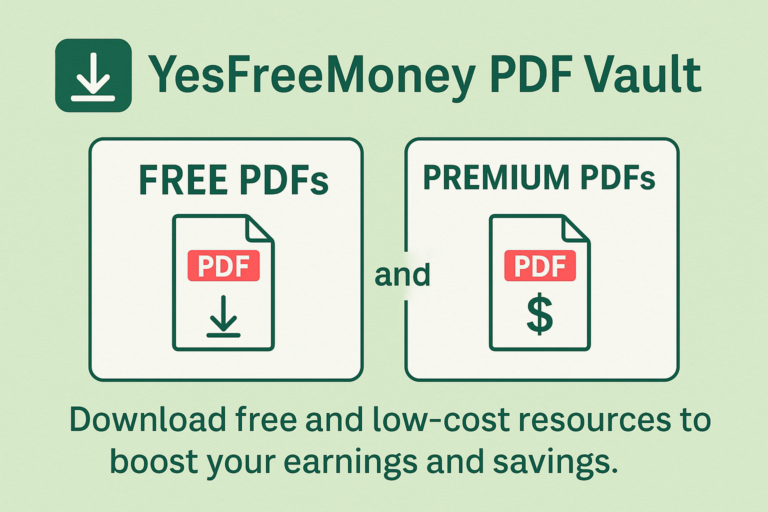
Manage Your Money Without Spending a Dime
Introduction
Managing personal finances can be daunting, especially with the costs of financial advice and tools adding up. However, the good news is that you don’t need to spend money to get your finances in order! There are a plethora of free financial tools and resources that can help you budget, invest, monitor your credit, reduce debt, and more.
In this guide, we’ll explore the best free financial tools available, offering tips and advice to help you take control of your finances and make the most out of these resources—without spending a penny!
Why These Free Financial Tools and Resources Help
Managing your finances doesn’t have to be complicated or costly. In fact, the right financial tools and resources can make it easier than ever to take control of your money—without the need to spend a dime.
We’ve compiled some of the best free financial tools available to help you with everything from budgeting and tracking your credit score to investing and saving money. Whether you’re a beginner just starting to learn about personal finance or someone looking to optimize your existing financial strategy, this post offers practical tools you can start using today.
By using the resources we’ve shared, you’ll be able to:
- Track your spending and create a budget that aligns with your financial goals, without any hidden fees.
- Monitor and improve your credit score to ensure you’re always in a position to make financially sound decisions.
- Invest and grow your wealth with free platforms that give you access to stocks, ETFs, and more without paying commission fees.
- Stay on top of bills and avoid late fees, freeing up more money for savings and investments.
- Reduce debt faster by utilizing tools that create personalized debt repayment strategies.
- File taxes for free, saving you money that can be better spent elsewhere.
- Educate yourself on personal finance, so you can make informed decisions about your money.

We’ve included tools and resources for every aspect of your financial journey, empowering you to build wealth, reduce debt, and save money effectively. With these free resources at your fingertips, you can achieve financial success without the need for expensive services or subscriptions.
1. Budgeting Tools
Tracking your income and expenses is the foundation of good financial health. Fortunately, several free budgeting apps can help you manage your money efficiently.
Mint
Mint is one of the most popular free budgeting tools available. It syncs with your bank account to automatically track and categorize your transactions, giving you a real-time view of your spending habits. You can create budgets, set up bill reminders, and even get personalized tips for saving.
Visit Mint
YNAB (You Need a Budget)
YNAB is another excellent tool, designed to help users prioritize their spending and save for future goals. While YNAB offers a free trial, many users find the monthly fee worth the price. If you’re looking for a free tool, Mint may be a better option for now.
Visit YNAB
EveryDollar
EveryDollar offers a free version that allows you to create a monthly budget, track expenses, and plan savings. It’s great for people who prefer a simple, easy-to-use budgeting tool.
Visit EveryDollar
Tip: Set up alerts in your budgeting app to notify you when you’re nearing your spending limits in certain categories. Start small—focus on a few spending categories before tackling everything in your budget to make it more manageable.
2. Credit Score Monitoring
A good credit score is crucial for everything from securing loans to renting a home. Fortunately, there are free resources that allow you to monitor your credit score and even receive personalized tips on improving it.
Credit Karma
Credit Karma is a widely used, free service that offers access to your credit scores from two major bureaus, TransUnion and Equifax. It also provides a detailed breakdown of factors affecting your score, such as credit inquiries and outstanding debt.
Visit Credit Karma
Credit Sesame
Credit Sesame is another free service that provides access to your credit score and report. It also offers identity theft protection features, which can help you stay vigilant against fraud.
Visit Credit Sesame
Tip: Check your credit score regularly (but not too often) to track progress. Many apps give you a free credit report once a year, which you should take advantage of. If you notice discrepancies in your credit report, dispute them immediately to maintain a healthy score.
3. Investment Platforms
Investing is one of the best ways to grow your wealth over time. You don’t need to be a millionaire to start investing—there are free platforms that allow you to begin with little money.
Robinhood
Robinhood is a commission-free investment platform that allows users to buy and sell stocks, ETFs, options, and even cryptocurrencies. It’s an excellent platform for beginners, as it’s easy to navigate and offers zero-commission trading.
Visit Robinhood
Webull
Webull is another free platform that offers commission-free trades. In addition to stocks, Webull also provides advanced charting tools, making it ideal for both beginner and intermediate investors.
Visit Webull
Acorns
Acorns rounds up your purchases to the nearest dollar and invests the spare change in a diversified portfolio. While the basic plan isn’t free, there’s a free version that lets you invest your spare change and automate savings.
Visit Acorns
Tip: Start with low-cost index funds or ETFs if you’re new to investing, as they are less risky and help you diversify your portfolio. Don’t just use free apps for the sake of no fees—always do research and make sure the platform fits your long-term investment goals.
4. Bill Management & Payment Reminders
Missing bill payments can hurt your credit score and result in late fees. Bill management apps can help you stay organized and avoid these pitfalls.
Prism
Prism is a free app that consolidates all your bills in one place and allows you to pay them directly from the app. It sends reminders so you never miss a due date, helping you stay on top of your payments.
Visit Prism
Truebill
Truebill is another free bill management app that tracks recurring subscriptions, helps you cancel unwanted services, and negotiates lower bills. It’s a great way to keep your expenses in check.
Visit Truebill
Tip: Set up automatic payments whenever possible to avoid missing deadlines and streamline your bill management. Use a calendar in your bill management app to stay ahead of due dates and avoid late fees.
5. Debt Reduction Resources
If you’re dealing with debt, there are free tools to help you create a strategy for paying it off. Whether you want to use the debt snowball method or a more advanced strategy, these resources can help.
Debt Payoff Planner
Debt Payoff Planner helps you plan your debt repayment using either the debt snowball or debt avalanche method. It allows you to input multiple debts and helps you figure out how to pay them off faster.
Visit Debt Payoff Planner
Debt Snowball Method
The Debt Snowball Method focuses on paying off your smallest debts first, giving you a quick win that motivates you to continue. While some people prefer the debt avalanche method (which tackles the highest-interest debt first), the snowball method is often seen as more motivating.
Tip: Use the Debt Snowball method for smaller debts first, as paying them off will give you a sense of accomplishment to motivate you further. When paying down debt, focus on the highest-interest debts first to save the most money in the long run.
6. Tax Filing
Filing taxes doesn’t have to be expensive. There are free services that allow you to file simple tax returns at no cost.
TurboTax Free Edition
TurboTax offers a free version for simple tax returns. It guides you through the process step by step, ensuring that you don’t miss any deductions or credits.
Visit TurboTax
H&R Block Free
H&R Block also provides a free filing service for simple tax situations. It includes a basic tax return, ensuring you don’t pay extra fees for filing.
Visit H&R Block
Tip: If your tax situation is simple, use the free tax filing options to save money on tax preparation services. Make sure you’re maximizing any deductions or credits you qualify for by researching them or using an automatic tool that identifies these opportunities.
7. Financial Education and Resources
Financial literacy is a key component of managing money effectively. Free resources can help you learn about budgeting, investing, taxes, and more.
Khan Academy
Khan Academy offers a comprehensive set of free courses on personal finance, investing, and more. The courses are easy to understand and great for beginners.
Visit Khan Academy
The Financial Diet
The Financial Diet is a blog and YouTube channel that covers topics such as budgeting, saving money, and managing debt. It’s perfect for people who want to learn about finances in a fun and relatable way.
Visit The Financial Diet
Podcasts:
Podcasts like “The Dave Ramsey Show” and “BiggerPockets Podcast” provide valuable insights on financial topics. Many of them offer tips on how to achieve financial freedom and live a debt-free life.
Tip: Listen to finance podcasts or read financial blogs regularly to stay updated on trends and strategies. Take notes on what you learn and apply it gradually to your financial routine, so the information doesn’t feel overwhelming.
8. Savings Tools and Resources
Building savings is a crucial part of financial security, and there are several free tools that can help you save money effortlessly. From setting up emergency funds to reaching your long-term savings goals, these resources can make saving easier and more efficient.
Chime
Chime is a digital bank that offers automatic savings features, including the option to round up your purchases to the nearest dollar and deposit the difference into your savings account. It’s a great tool for people who want to save money passively.
Visit Chime
Qapital
Qapital is another app that encourages savings by allowing you to set up personalized savings goals. You can save for specific goals (like a vacation or an emergency fund) and set up automatic transfers to fund those goals regularly.
Visit Qapital
Simple Bank
Simple Bank offers a unique “Goals” feature, which helps you automate your savings. You can set goals for things like travel, a new phone, or an emergency fund, and the app makes it easy to save by automating transfers and categorizing your goals.
Visit Simple Bank
Tip: If you’re saving for a big goal, automate your savings by setting up recurring transfers. Start small—saving a small amount regularly is better than trying to save large sums all at once, which can feel overwhelming.

Advice for Making the Most of These Free Financial Tools:
- Start Simple
If you’re new to using financial tools, it might feel overwhelming at first. Start with one or two tools that address your most immediate needs—whether that’s budgeting, monitoring your credit, or setting savings goals. Once you’re comfortable, you can add more tools to enhance your financial strategy. - Set Realistic Goals
Financial success doesn’t happen overnight. Whether you’re trying to pay off debt, save for an emergency fund, or invest for retirement, set small, achievable goals that you can build on over time. Use these tools to track your progress and stay motivated. - Check for Updates
Many of the free financial tools we mentioned offer new features and updates regularly. Make sure to check back and explore any new additions that could make managing your finances even easier. You don’t want to miss out on added benefits that could streamline your financial planning. - Automate Where Possible
One of the easiest ways to stay on top of your finances is by automating your savings, bill payments, and even investments. This reduces the risk of missing payments, spending impulsively, or forgetting to transfer money to your savings account. Many of these tools offer automation features to make your life easier! - Be Consistent
Consistency is key when it comes to personal finance. Even the best tools won’t help if you don’t use them regularly. Set aside time each week to review your finances, check your budget, and ensure you’re sticking to your financial goals. - Educate Yourself
Don’t just rely on tools—take time to educate yourself about personal finance. Many of the resources we’ve shared, like blogs, podcasts, and educational platforms, provide valuable information that can help you make smarter decisions with your money. - Stay Patient
Financial progress takes time. Whether you’re building savings or paying down debt, be patient and stick to your plan. Use the tools as part of your long-term financial strategy and celebrate small wins along the way to stay motivated.
Conclusion
With the right tools and resources, you can take charge of your financial future—without spending a penny. Whether you’re budgeting, investing, or managing debt, there are plenty of free options available that can help you achieve your financial goals. Take advantage of these free financial resources, implement the tips we’ve shared, and start making smarter financial decisions today.




